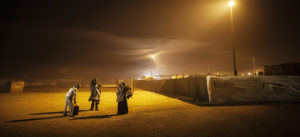You have no items in your cart. Want to get some nice things?
Go shopping The word “refugee,” believed to be of French origin, was first used in the modern context to refer to the Protestant Huguenots who had to run away from their country to escape religious persecution by the French king, Louis XIV. Refugees and their stories have featured in literature from time immemorial. They are cast in heroic roles in the Bible and the Koran. The gospels advise us to make them feel at home when they arrive at our doorstep, exhausted by long and arduous journeys. In Virgil’s epic poem, Aeneid, Aeneas the Trojan sails across the Mediterranean in search of refuge and manages to find it in Italy. This refugee then went on to found the dynasty that built the Roman empire.
The word “refugee,” believed to be of French origin, was first used in the modern context to refer to the Protestant Huguenots who had to run away from their country to escape religious persecution by the French king, Louis XIV. Refugees and their stories have featured in literature from time immemorial. They are cast in heroic roles in the Bible and the Koran. The gospels advise us to make them feel at home when they arrive at our doorstep, exhausted by long and arduous journeys. In Virgil’s epic poem, Aeneid, Aeneas the Trojan sails across the Mediterranean in search of refuge and manages to find it in Italy. This refugee then went on to found the dynasty that built the Roman empire.
A number of books, written either by refugees or about them, line the fiction and non-fiction shelves of bookstores today. The British newspaper, The Guardian, has appointed a “migration correspondent” exclusively to interview refugees in different parts of the world and share their stories with readers. It is not easy to write about being a refugee or to trace the trajectories of lives uprooted by war or religious persecution. Writers who try to make sense of this complex, sensitive, and emotionally fraught subject take on a challenging task. There are many dangers to be wary of including oversimplification, exoticisation of the “other,” and the urge to give into sentimentality that reduces all refugees to faceless victims. Tough as it is, many writers feel compelled to explore the subject. This is hardly surprising since we live in a fractured world where millions of people are being forced to flee from their homes due to external aggression or civil war.
According to the UN High Commission for Refugees, about 4.3 million Syrians are refugees and a further 7.6 million have been displaced. Estimates say there are 3.1 million displaced people in Iraq today. “We are revisiting one of the most catastrophic features of the end of Ottoman rule, namely the murder and migration of whole groups of people,” says well known journalist Patrick Cockburn, author of The Age of Jihad. Violent, brutal civil wars rage in many countries in the Middle East and North Africa. Civilians caught in the crossfire undertake desperate journeys – by boat, by air, by foot, by any means available – in search of safety.
In her 2016 Giller Prize winning novel, Do Not Say We Have Nothing, Canadian writer Madeleine Thien paints a searing portrait of lives destroyed by the civil war in China. Thien’s novel traces seven decades of Chinese history to tell the stories of people who are forced to be refugees in their own land. The novel’s sprawling cast of characters includes a family of musicians who are sent to a labor camp at the height of Mao’s Cultural Revolution. Exiled from the music they hold dear, their lives lose all meaning. Their stories are interwoven with that of a young woman who escapes to Vancouver after the Chinese government’s crackdown on the student protestors at Tiananmen Square. Whether they live in the distant past or in an uncertain present, the characters in Do Not Say We Have Nothing struggle to find refuge in a cruel and chaotic world torn apart by repressive, violent regimes.
In his powerful and often shocking novel, The Other Hand, Chris Cleave depicts the life of a Nigerian teenager held at an immigration detention centre in the UK. The trauma of displacement is relentless, and its psychological impact unfathomable. The Other Hand tries to grapple with the many layered complexities of forced migration and uncovers the horrific wounds it leaves on the psyche of those affected. Tasneem Jamal’s Where the Air is Sweet, Lawrence Hill’s The Illegal, Kim Thuy’s Ru, Philippe Claudel’s Monsieur Linh and His Child, Dave Eggers’s What is the What, Marjane Satrapi’s Persepolis (an engrossing graphic novel about a young girl growing up in Iran under a regressive, fundamentalist regime), Jeremy Harding’s The Uninvited (a detailed history of migration in and to Europe in the late 90s and the asylum systems available to refugees at the time of the Balkan wars), and Goodbye Sarajevo (a memoir by Atka Reid and Hana Schofield about their experience of life during the war in the Balkans and their fight for survival), all explore the refugee experience with sensitivity from various perspectives. They tell the stories of lives disrupted and rebuilt, loves lost and remembered, and struggles that demand the impossible of people scattered across the globe.

About Vineetha Mokkil
Vineetha Mokkil is the author of the short story collection, "A Happy Place and Other Stories" (HarperCollins). She received an honorary mention in the Anton Chekhov Prize for Short Fiction 2020 and was shortlisted for the Bath Flash Award in 2018. Her fiction has appeared in Gravel, the Santa Fe Writers' Project Journal, Cosmonauts Avenue, Quarterly Literary Review Singapore, and "The Best Asian Short Stories 2018" (Kitaab, Singapore).



